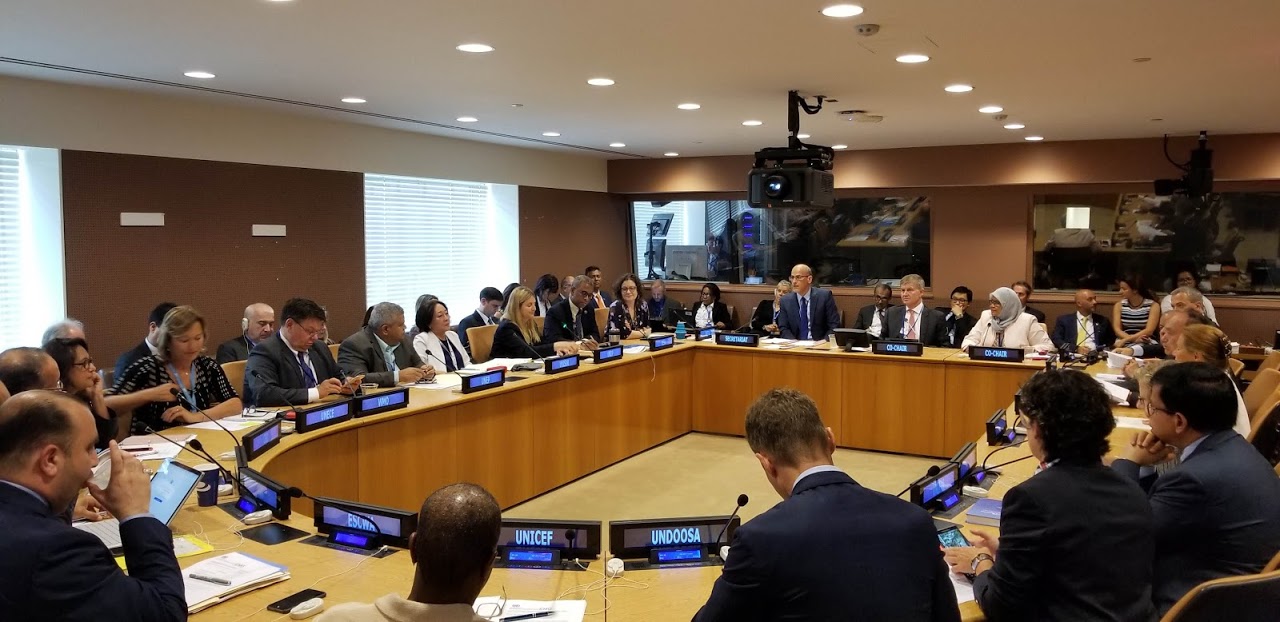The 73rd Session of the United Nations General Assembly hosted a plethora of important high-level meetings. Among these was the 24th UN Senior Officials Meeting of the UN Environment Management Group which was held in the margins of the High Level Segment of the UNGA. It gathered an unprecedented number of UN agencies, and the Bretton-Woods Institutions, including 27 heads of agencies and 20 other senior officials. The meeting was chaired by Mr. Erik Solheim, Executive Director of UN Environment, and co-chaired by Ms. Maimunah Mohd Sharif, Executive Director of UN-Habitat.

The Senior Officials meet annually to discuss emerging environmental challenges that warrant collaboration and partnership by the UN system. The meeting underlined the interdependence of environmental, social, and economic sustainability and the opportunities for collaboration and synergies in addressing environmental dimension of the 2030 Agenda.
The meeting resulted in the following outcomes:
Sand and dust storms are becoming more detrimental to both, places in their direct path, as well as the rest of the globe. At this meeting, the senior officials approved a proposed UN coalition to combat these storms. Major areas of concern within this topic include outreach and advocacy, increasing preparedness and warning systems, as well as supporting innovative approaches that are already successfully being implemented. As agencies look for technical solutions to this health and environmental problems being presented and they are also looking to include the private sector in these efforts. With the coalition approved the agencies present set their sights on what comes next. They decided that focal points and development terms must be introduced and agreed upon and short and long term plans must be put into action.
 A video by WMO is shown on Sand and Dust Storms featuring a call to action by the late former UN Secretary General Kofi Annan.
A video by WMO is shown on Sand and Dust Storms featuring a call to action by the late former UN Secretary General Kofi Annan.
Another major problem arising in our ever technologically evolving world is the problem of electronic waste, or e-waste. With a coalition already in the works the meeting focused on areas of improvement and engagement. The board members called for increased information flow to the general public. This is including, but not limited to, ideas such as awards that increase awareness to things being done to stop this ongoing problem and building up member states to be better equipped to deal. There was a heavy focus on the next steps of the coalition as well. There will always be a need to raise revenue and continue to work on the structure and policy of the coalition.
Along with the new coalition for the Sand and Dust storm coalition, the meeting also set up a coalition concerning the greening of the Belt and Road Initiative. This initiative aims to expand ancient trade routes spanning from China to Europe, this will involve a lot of investment from all countries involved. This initiative will definitely have a huge social, economic, and environmental impact. The task force is to look at the policy of the initiative and make sure that it is indeed aligning with the United Nations call for Sustainable Development. This is a chance for a lot of collaboration with many different UN agencies. The main concern of the board was placed on infrastructure and its constant need for maintenance. The task force is also to be implemented to work for inter-agency issues that the initiative addresses. Future steps include a serious look at focal interests of the task force as well as terms of operation in reference to the initiative.
Biodiversity is fast diminishing from the face of the Earth. Work is being done by the United Nations to slow down the loss of species. At this meeting board members heard about the progress since their last meeting. EMG has been able to create a dialogue about this important issue and has definitively linked human security on the earth and biodiversity. As the year 2020 is quickly approaching the board discussed future plans for the work on biodiversity. It was agreed upon that further education of the public and an integration of biodiversity protection into policies and mandates were needed to continue to protect the biodiversity we have left. EMG members have the unique role of having the ability of developing framework and provide their expertise on the matter to agencies that are in need of help. The UN System-wide Framework of Strategies consultative process has focused on biodiversity this year through its annual thematic report. This report looks to map UN Collaboration on Biodiversity.
The senior officials also had the chance to review the Strategic Approach and the sound management of chemicals and waste and the work that has been done thus far as well as points of consideration for them in the coming years. They are looking to continue the strategic approach past 2020 and collaborate with other UN agencies and entities to contribute to the common goal of educating people about this issue. They want to raise awareness not only for the general public but within the United Nations as well so that it is included in the economic and social development planning. Looking forward there was a call to an inter-agency discussion of the topic.

Mr. Elliot Harris, UN Assistant Secretary General fro UN DESA and UN Chief Economist was recognized by the Environment management group for his efforts during his tenure at UN Environment.
The Senior Officials meeting ended with the creation of a few new task forces and review of the progress of others. Information was shared between these big agencies, to make sure that the issues being addressed can be resolved. As all these issues have a major impact on the quality of human life.
